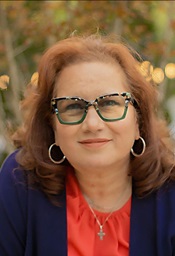Rev. Héctor A. Burgos-Núñez
March 28, 2012 | Greater New Jersey Annual Conference
Whose mission is it anyway? I had never considered this question before, until recently. Since I first became active in leadership in my local congregation, I was always told that our leadership team needed to discern "our mission." What an exhausting process that was. For hours and hours, every year we went over different biblical passages, talked about the needs of the community, and how we could create programs and initiatives to address their needs and make a difference in people's life.
It has been a blessing to read the book Faithful Witnesses: United Methodist Theology of Mission, by John Nuessle. It helped me to discern that the mission of the church is not "our mission" on behalf of God, but God's mission in the world to which we are invited to join and collaborate to make God's dreams for his creation a beautiful reality. As Nuessle's declares in his book, "We, all believers, are called to participate in the misssio Dei ? God's Mission in the world ? as faithful witnesses to the fullness of God's grace" (p. 21).
So what is God's mission in the world? According to Nuessle, it is to spread his reconciling love, as manifested through Jesus Christ, to all of creation (John 3:16-17). This love, God's grace, which is the very nature of God, it's also the nature of "God's interaction with the world, human and natural" (p. 17), it is our mission ? we share it and incarnate it through word and deeds. Just as we cannot "manufacture grace or manipulate its presence", we cannot manufacture a mission outside of the one that has already been given by God, Jesus Christ.
As people of faith, we need to embrace the gift of God's grace, and join God in this mission of love by sharing the good news of Jesus Christ with all. This is not a matter of what we do, but rather of who we are called to be. Mission "is not so much what we do as who we are. We are the church of Jesus Christ that participates in what God is doing in the world" (p. 24). This is the foundation of our theology of mission: the church exists to "point the peoples of the world toward the gracious free gift of love and acceptance in Jesus Christ, and for us, as the body of Christ, to live the reality of God's loving presence in the world. Christ, who as the Word was God" (p. 18). If we are not doing this, whether we want to consider it or not: we are not the church of Jesus Christ.
This understanding of God's work in the world is crucial if we are to be effective in the work of witnessing to people about the love of Jesus Christ, locally and around the world (Acts 1:8). Our mission work, instead of mere programs and initiative, ought to be a reflection to the world of our identity as disciples of Jesus Christ (p. 24). It should be a tangible expression of god's grace, which is always reaching out to us, bringing us closer to a full relation with our Creator (P. 26). Sharing the good news should not be limited to a passive proclamation (we are not mere messengers) ? we proclaim the good news of Jesus Christ through words and deeds ? we are "doers" of God's mission (P. 27).
We are at a time in the life of our beloved denomination, The United Methodist Church, where we need to, once more, hear God's call to "participate in the mission Dei through a lifelong journey as faithful witnesses to the living Lord Jesus Christ" (P. 39). Once more, we are being called by God to "live in the way of Christ" (P. 41).
As disciples of Jesus Christ, in our connectional system, we need to understand that we cannot effectively fulfill God's big dream for all creation by ourselves ? we simply can't. If we are to be the church of Christ and effective participants in the mission Dei, "we must seek the natural relationships that enable us to be both visible as Christ body in the world, and to engage the world with the Gospel (P. 91). Is through this understanding of an organic-connectional organization, which is central in our Wesleyan tradition, that we, as Nuessle argues, "can literally beat the devil" at his game (P. 92). Our connectional structure is not merely a way to organize for business, but as Nuessle suggests, "it is the biblical model for the church to be organized for its task of witnessing in the entire world (P. 93).
As we seek to live in the world, as witnesses of the God of Love, Mercy and Justice, we need to claim this vision of who we are, and whose mission we are being called to join. No more, we should insist in asking God to join "our mission" and fit in our models of ministry. This needs to happen at all levels in the life of the church, from General Conference and our Council of Bishops, all the way to our local congregations. It needs to infest both clergy and laity, young and old, men and women, children and our youth. We need to reclaim a vision of God's mission, join God in mission, and work hard to transform our local "Jerusalems" so that out of our local congregations and communities we can go out into the world and be in global ministries that will heal, feed, nurture, care for, and empower the people of the whole world.
March 28, 2012 | Greater New Jersey Annual Conference
|
It has been a blessing to read the book Faithful Witnesses: United Methodist Theology of Mission, by John Nuessle. It helped me to discern that the mission of the church is not "our mission" on behalf of God, but God's mission in the world to which we are invited to join and collaborate to make God's dreams for his creation a beautiful reality. As Nuessle's declares in his book, "We, all believers, are called to participate in the misssio Dei ? God's Mission in the world ? as faithful witnesses to the fullness of God's grace" (p. 21).
So what is God's mission in the world? According to Nuessle, it is to spread his reconciling love, as manifested through Jesus Christ, to all of creation (John 3:16-17). This love, God's grace, which is the very nature of God, it's also the nature of "God's interaction with the world, human and natural" (p. 17), it is our mission ? we share it and incarnate it through word and deeds. Just as we cannot "manufacture grace or manipulate its presence", we cannot manufacture a mission outside of the one that has already been given by God, Jesus Christ.
As people of faith, we need to embrace the gift of God's grace, and join God in this mission of love by sharing the good news of Jesus Christ with all. This is not a matter of what we do, but rather of who we are called to be. Mission "is not so much what we do as who we are. We are the church of Jesus Christ that participates in what God is doing in the world" (p. 24). This is the foundation of our theology of mission: the church exists to "point the peoples of the world toward the gracious free gift of love and acceptance in Jesus Christ, and for us, as the body of Christ, to live the reality of God's loving presence in the world. Christ, who as the Word was God" (p. 18). If we are not doing this, whether we want to consider it or not: we are not the church of Jesus Christ.
This understanding of God's work in the world is crucial if we are to be effective in the work of witnessing to people about the love of Jesus Christ, locally and around the world (Acts 1:8). Our mission work, instead of mere programs and initiative, ought to be a reflection to the world of our identity as disciples of Jesus Christ (p. 24). It should be a tangible expression of god's grace, which is always reaching out to us, bringing us closer to a full relation with our Creator (P. 26). Sharing the good news should not be limited to a passive proclamation (we are not mere messengers) ? we proclaim the good news of Jesus Christ through words and deeds ? we are "doers" of God's mission (P. 27).
We are at a time in the life of our beloved denomination, The United Methodist Church, where we need to, once more, hear God's call to "participate in the mission Dei through a lifelong journey as faithful witnesses to the living Lord Jesus Christ" (P. 39). Once more, we are being called by God to "live in the way of Christ" (P. 41).
As disciples of Jesus Christ, in our connectional system, we need to understand that we cannot effectively fulfill God's big dream for all creation by ourselves ? we simply can't. If we are to be the church of Christ and effective participants in the mission Dei, "we must seek the natural relationships that enable us to be both visible as Christ body in the world, and to engage the world with the Gospel (P. 91). Is through this understanding of an organic-connectional organization, which is central in our Wesleyan tradition, that we, as Nuessle argues, "can literally beat the devil" at his game (P. 92). Our connectional structure is not merely a way to organize for business, but as Nuessle suggests, "it is the biblical model for the church to be organized for its task of witnessing in the entire world (P. 93).
As we seek to live in the world, as witnesses of the God of Love, Mercy and Justice, we need to claim this vision of who we are, and whose mission we are being called to join. No more, we should insist in asking God to join "our mission" and fit in our models of ministry. This needs to happen at all levels in the life of the church, from General Conference and our Council of Bishops, all the way to our local congregations. It needs to infest both clergy and laity, young and old, men and women, children and our youth. We need to reclaim a vision of God's mission, join God in mission, and work hard to transform our local "Jerusalems" so that out of our local congregations and communities we can go out into the world and be in global ministries that will heal, feed, nurture, care for, and empower the people of the whole world.




